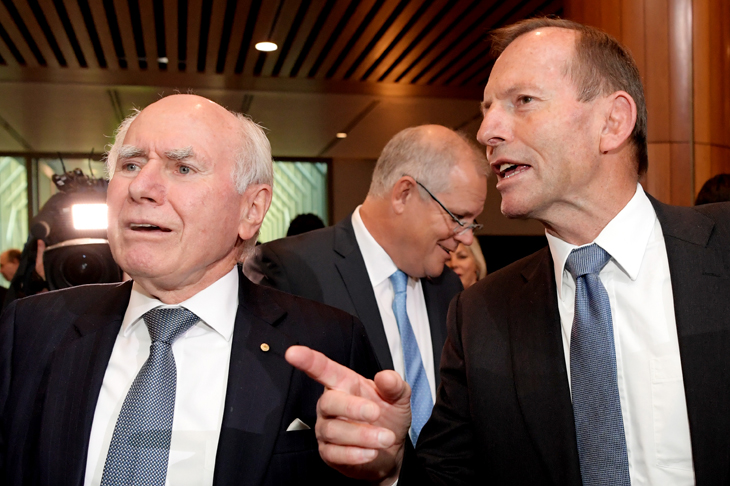Having turned 80 last month and 12 years out of office, Australia’s 25th Prime Minister John Winston Howard’s occasional and well-considered public opinions are a welcome reminder of how much he is missed. Take, for instance, his current criticism of the Reserve Bank’s record low one per cent official interest rate and his warnings about China’s worsening authoritarianism, seen in the crackdown on the Hong Kong demonstrations
Both issues are of vital concern. On interest rates, the RBA’s desire to implement its policy of encouraging greater spending and economic growth, increasing inflation and lowering unemployment below five per cent by cutting the cost of borrowing to unprecedented levels, is matched by former Treasurer Howard’s contrary longer-term concern that the official rate has been lowered ‘too far’ already. ‘We came through the GFC so well because our interest rates were higher when we entered the GFC and the central bank had room to move.’ He fears the RBA has left Australia lacking ammunition to deal with any coming global shock – especially in view of huge global debt levels and the potential for disruption from the US-China trade war, Brexit and Europe’s internal troubles.
The RBA is worried by depressed Australian household consumption due to a combination of low income growth and falling house prices – despite a massive increase in the number of people in jobs (many of whom, it says, are under-employed). Even though lower interest rates reduce the incomes of those with savings, the RBA claims that this represents, overall, only half as much as is added to the disposable income of those with debts such as mortgages. And by driving the Aussie dollar lower, they make Australian business more internationally competitive while also stimulating the unsettled housing sector. The criticism that lowering the cost of borrowing will simply push up demand, and therefore make housing more expensive, has the political benefit of halting the fall in house prices that was reducing household wealth, impacting on spending – and making voters unhappy! So the Domain property group has welcomed the RBA’s move, listing ‘lower interest rates as a key reason for a predicted turnaround in property prices… [that] will help boost the construction sector which is facing a downturn’.
While Howard says he does not expect the RBA to take his advice on interest rates, his China warnings must be heeded. Having led a high-level government-sponsored Australian delegation to China only late last year as part of an attempted rapprochement with China after difficulties under the Turnbull government, Howard’s views are well informed. At a meeting earlier this month with top US officials, he described the upheaval in Hong Kong as ‘a glimpse of the future for Chinese society’ and questioned the long-term viability of China’s economic and political system. ‘Australia’s relationship with Beijing is becoming more difficult because the regime in China is a lot more authoritarian’ and that we should not be mesmerised by China’s ‘overwhelming economic importance to Australia’. This mirrors the substance of Liberal MP Andrew Hastie’s excellent analysis of a fundamentally different and ideology-shaped China under Xi Jinping that ‘will test our democratic values, our economy, our alliances and our security like no other time in Australian history.’ No longer can the West believe that ‘economic liberalism would naturally lead to democratisation in China… Xi’s view of the future is one where capitalism will be eclipsed and the consolidation of and development of the socialist system will require its own long period of history’. According to the SMH, ‘none of the politicians criticising some of Hastie’s language has argued against his central proposition that China is a present threat to Australian sovereignty and liberty’.
All this follows a Howard speech to a London Intelligence Forum last year that ‘Chinese assertiveness’ was an even more pressing problem than cyber threats. He noted that China has a massive diaspora spread across the Pacific (with 1.2 million in Australia) and that China is very interested in the capacity to use these people to further her power and her interests. You have been warned.
Got something to add? Join the discussion and comment below.
Get 10 issues for just $10
Subscribe to The Spectator Australia today for the next 10 magazine issues, plus full online access, for just $10.
You might disagree with half of it, but you’ll enjoy reading all of it. Try your first month for free, then just $2 a week for the remainder of your first year.














Comments
Don't miss out
Join the conversation with other Spectator Australia readers. Subscribe to leave a comment.
SUBSCRIBEAlready a subscriber? Log in